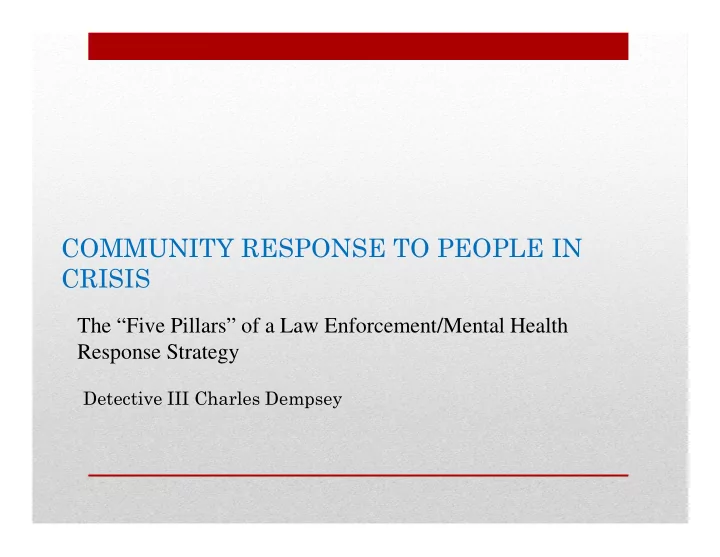

COMMUNITY RESPONSE TO PEOPLE IN CRISIS The “Five Pillars” of a Law Enforcement/Mental Health Response Strategy Detective III Charles Dempsey
• Los Angeles Police Department • Los Angeles County Department of Mental Health/Emergency Outreach Bureau-Law Enforcement Program • Crisis Response Support Section • Mental Evaluation Unit (MEU) • Triage • Systemwide Mental Assessment Response Team (SMART) • Case Assessment Management Program (CAMP) • Administrative Training Detail • Threat Management Unit (TMU) Los Angeles Police Department
• Training • Triage • Crisis Response • Follow Up • Community Engagement The “Five Pillars”
• Training • LAPD Basic Academy (15 hours) • Mental Health Intervention Training (40 hours) • Policies and Procedures • Community The “Five Pillars”
• Triage • Mandated Reporting • Advise and Guidance • Critical Incident Support • Referral of high risk individuals to Case Management follow up teams The “Five Pillars”
• Crisis Response • Co-Responder • Police Officer ( LAPD ) • Access to Law Enforcement Database • Mental Health Clinician ( LACDMH ) • Access to Countywide Database • Immediate Intervention • In field clinical assessment The “Five Pillars”
• Follow Up • Co-Deployed • Detective ( LAPD ) • Mental Health Clinician ( LACDMH ) • High Risk • High Recidivist • Intensive Case Management The “Five Pillars”
• Community Engagement • Mental Health Crisis Response Program Advisory Board • Los Angeles County Department of Mental Health • National Alliance on Mental Illness • Autism Society of Los Angeles • Community Service Providers • Hospital Associations • School Districts The “Five Pillars”
• Community Engagement (cont..) • Community Mental Health Resource Guide • 911 Checklist • MEU Senior Lead Program • Los Angeles County Department of Mental Health / System Leadership Team • District Attorney’s Mental Health Advisory Board – Diversion • Citizen Police Academies The “Five Pillars”
• 2016 Crisis Calls for Service – 20,041 ( confirmed mental illness ) • 78% were in caregiving environment (residence, board & care, etc.) • 22% homeless � 74% resulted in Involuntary Mental Health Detentions • 60% resulted in one-time contacts due to successful initial intervention � 10% resulted in arrest • 253 individuals diverted from custody pre-booking • 95 individuals diverted post-booking � 12% resulted in referral to outpatient provider/clinic ( voluntary ) � 989 cases referred to CAMP for intensive case management • 60% of the cases referred resulted in successful linkages to services • 238 Firearms seized Measures and Outcomes “COMPSTAT”
National Law Enforcement /Mental Health Learning Site
• A Descriptive Study of the LAPD’s Co-Response Model for Individuals with a Mental Illness (Lopez, 2016) • A Police Culture Shift: A Study of the effectiveness of the Mental Health Intervention Training (MHIT) and it’s Impact on Police Officer Attitudes toward Mental Illness (Mirkof et al, 2017) • Suicide by Cop: A New Perspective on an Old Phenomenon (Jordan 2017) • Beating Mental Illness: Crisis Intervention Team Training and Law Enforcement Response Trends (Dempsey 2017) • Diagnosis and Management of Agitation: Agitation in Field Settings-Emergency Medical Service Providers and Law Enforcement (Dunn / Dempsey 2017) Research/Articles
“An empathetic response to a person in crisis” Families shouldn’t have to worry!
• 911 Call Diversion (SAMSHA Sequential Intercept Model – Intercept 0) • Tele-Psychiatry in Municipal Jail • Nurse Practitioner Response Unit (NPRU) Fire Dept. • Providing Alternatives to Hinder Extremism (PATHE) What’s next……
• Los Angeles Police Department – Mental Evaluation Unit � Twitter @LAPDMEU � Facebook LAPDMEU � Instagram #LAPDMEU Social Media
Recommend
More recommend